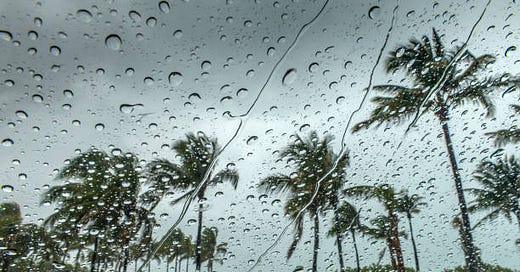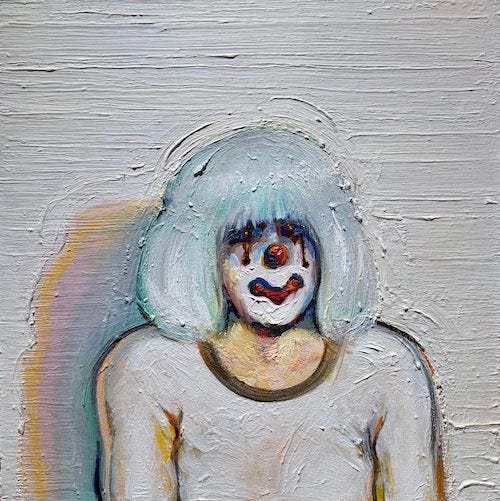Feel the rain — a short story response to "Without Sky"
Rejecting skyless nihilism for shadows, height, and truth
Friends,
In 2020, I was desperate for lockdown distractions. One of my projects was writing a short story response to something written by one of Russia’s leading political operatives. The objective was to rebuke a worldview. This was at a time when I was grappling with my own journey through Trumpism.
I recently dusted off my short story and thought I’d share it with you.
First, some context: In 2014, one of Putin’s then-close advisors Vladislav Surkov penned a short science fiction story called “Without Sky.” He wrote it under the pseudonym Natan Dubovitsky. I first heard about the essay in 2015 when I was writing an information warfare paper for NATO.
“Without Sky” was viewed as a window into Russian thought on conflict. It conveyed the post-truth, surrealist ethos at the heart of 21st century Russia that Peter Pomerantsev captures in his 2014 book, Nothing is true and everything is possible. My story may make more sense if you read “Without Sky” first. (If this is too weird or you don’t have time, feel free to skip.)
Here is my response, “Feel the rain.”
Feel the rain
When I was nine, I took the trip of my life. I visited the skyless village of the two dimensionals.
The Society took me in. There was a circus on my third day there. They said it was to honor the heroes of The Fifth War and then winked. It wasn’t a full wink but a gesture in that direction. A half-wink. The lack of seriousness was strange. But I understood what they meant because there had been no heroes in the Fifth World War. Everyone was hero and villain, perpetrator and victim, combatant and neighbor. They accepted this paradox. They embraced this refracted reality. Every yes or no was a half-truth.
I later learned that the Society leaders organized these circuses monthly. The one I attended was full of bright colors and candy, like a Holi Festival with no subtlety. I recall some sort of celebration of a new beginning. “We will come tomorrow,” yelled a Society boy with a button-nose, punching upward in the air. “We will conquer or perish!” Most people ignored him.
A young woman with large hips, thick legs, and a tiny upper body approached me as I wandered the circus, waving her arms like a fan to clear the pink in the air. “You like the colors and smell, yes or no?“ She was referring to the coal haze. “We put colors in it. We make it smell good.” The Society had a coal mine. They burned rainbow-colored coal every month at the circus. They made it smell like cherries or oranges or baby powder. I breathed in and smelled bubblegum.
“Where do coal fumes go in a world without sky?” I turned to the woman with the funhouse physiognomy. But she had already left.
A moment later, a Saturn-shaped teenager on stilts appeared in the distance. Instead of stretching him vertically, the stilts expanded him horizontally in all directions, like cookie dough flattened by a spatula. I walked toward him. “Do you want to try these stilts, yes or no?” he asked.
I marveled at the boy-man’s squished body and shook my head. “No.”
By the end of my month among the two dimensionals, I grew fond of their world. The Society took pride in being two dimensional. They revolted against the hidden spaces and hypocrisies. “Down with complexities!” I shouted in chorus with them.
Theater was their language, and they made me, a visiting child, a part of a show that never seemed to end. Everything was half-serious and dramatic yet somehow stilted. They could not lie, but they could not tell the truth either. It was like living in a coloring book about revolution rather than the real thing.
“Do you want to stay here and live with us, yes or no?” asked the wide-lipped, mop-haired Society leader who organized my visit. He gave me that half-wink.
Nine-year-old me wanted to scream Yes! The two dimensionals felt like family by that point, a roving band of carnival brothers and sisters. Fellow orphans, too. I had lost my own family in The Fifth War three years earlier. The War had ravaged my home country, too. You couldn’t see the destruction in the pedestrian downtowns, boulevard strip malls, or planned communities. But you could feel it in the air. A deflated energy.
Was my Society host serious? Did they really want me to stay? It felt exhilarating to be given the choice. It felt empowering and grown-up, a chance to be part of something rebellious and world-changing. What would I be going home to anyways?
And yet, I felt the pull of the real and familiar. I missed knowing up from down on the monkeybars. I missed tracking my growth on the wall. I missed gazing at the moon.
***
I can see now, decades later, the problems that led to The Fifth War. The fog of war was not a consequence of conflict but a cause of it. Cynicism too. The tears of a clown consumed the world.
I realize now why the clown cries. He lives in a permanent mime. He can’t tell up from down, truth from jokes. His binaries — yes or no, black or white — are a simulacrum of truth but not actual truth. The world is complex and thus, by definition, irreducible and at times ambiguous.
For a long time I envied the two dimensionals and longed to be with them, but now I feel sorry for them. It’s not a condescending type of pity, but the pity of someone who enjoyed their desserts, laughed at their shows, and smelled their bubblegum-flavored coal during that visit several decades ago. Empathy — no, sympathy — no, empathy.
My shadow is still here, thankfully. It follows me like a cat. It stretches and shrinks with the sun. It is sly and mysterious, but I am in relation to it.
It rained earlier today and, for a while, I couldn’t see my shadow. The rain was thick and tropical, a flood of tears from heaven. Nimbostratus, I thought to myself looking up, face into the rain, at the low-hanging clouds.
“Let’s splash in the puddles,” said the young one. We were barefoot and blinking through staccato dollops of warm water. The young one spotted a crater-sized puddle and stomped in it, splashing me. I stomped back and we laughed.
Just then, the sun peeked through a crack in the clouds. I looked up, face wet and dripping, and felt the warmth. I noticed the return of my shadow, cast across the puddles. Spider webs previously unseen were glinting. The sky was vivid with cracks of color through the gray. The world was sturdy again. I knew in my bones everything was going to be ok. The two dimensionals could never conquer this — never have, never will.
The young one smiled and it consumed his face. His eyes twinkled like the stars. Thank you, I whispered to my nine-year-old self for choosing to come home.
We are here today. We are alive and undefeated. There is always another way. Rejoice!
##
Music inspiration: “Rain” by Creed






